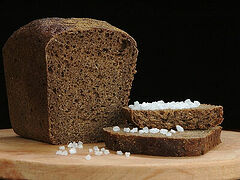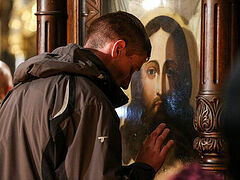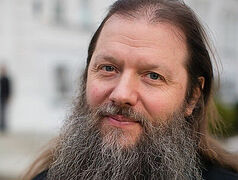Open to me the doors of repentance, O Lifegiver; For my spirit rises early to pray towards Thy holy Temple!
By ourselves, by our own efforts, we can neither achieve true freedom from sins and righteousness before God, nor even open for ourselves the doors of repentance—that is, cease living lawlessly! “But is it true?” someone who hasn’t personally experienced the action and power of true repentance might ask. “If I was able to expose myself to sins, then why can’t I give up sin and start living righteously? My freedom means I’m free to do what I want. Sin doesn’t take away my freedom, therefore, it doesn’t take away the opportunity to stop sinning”—a rather specious reasoning only showing that those who think this way have never taken up the work of repentance as they should. Take it up, and then you’ll know what sin means, what it does with your freedom, and how hard it is to arise from the trench of the passions.
Sin definitely doesn’t take away your freedom as a necessary capacity in the makeup of the soul, but does to it the same thing that rust does to iron. As rusty iron loses its strength to the point that what great efforts couldn’t break before can now break and tear from a single strain, although the volume and quantity of iron remains the same, so the sinner remains but a ghost of freedom. In some cases he’s seemingly freer than a righteous man himself who is always bound by conscience and the fear of God, but there’s no inner power for good, and with his small effort towards any good feat, the sinner is weak, like a child. Why is that? Because with our freedom—let’s use another comparison—the same thing happens with sin as happens with a magnet when it’s used incorrectly. A magnet loses the power to attract iron and indicate the cardinal directions, and our freedom loses the power to attract will and desire to itself and to act with them according to the law of conscience.
Such is the property of sin, and at the same time the punishment for it, that the sinner, after each iniquity, loses part of his ability to work righteousness. This loss, with the continuation of the sinful state, finally comes to the point that the poor sinner becomes a complete slave to his passions and evil habits. It’s no longer possible for him not only to rise from the trench of the passions without someone else’s help, but it’s hard to even think about returning to the right path. If in walking the path of iniquity we haven’t experienced this for ourselves yet, then that’s a sure sign that we haven’t even begun true repentance for our sins. Perhaps it was on our lips, or even made some temporary change in our actions and relationships, but it obviously didn’t reach to the very source of evil within us; it didn’t enter our very hearts and souls. Otherwise, we would have felt the same thing that all those who have truly repented have felt for themselves: We would have seen the terrible power of sin and the passions; we would have known all the weakness of our will and our mind; we would have come to the same feeling of hopelessness that one man was in when he cried out: Bring my soul out of prison, that I may praise Thy Name (Ps. 141:8).
Therefore, the first and last hope of those who are truly repenting is not themselves, not their minds or hearts, but the grace of God. They humbly confess that if it isn’t the Lord Himself who builds the house of their soul, then all labors and exploits for its correction will be in vain: Without help from above, with all their efforts, it will remain in ruins. And this feeling of their own infirmity makes them ever turn their gaze on high, prayerfully calling out to the mighty and living God to send down the grace of repentance and to grant strength to hate sin, to break the bonds of the passions, to love, acquire, and preserve purity and truth, which are alien and repugnant to the sinner.
These very feelings are expressed in the touching hymn that we presented in the beginning of our talk, my brethren. As the holy Church repeats it every week, let us delve into and reflect upon it a little more.
“Open to me the doors of repentance, O Lifegiver!”
“Thou Thyself”—the repentant sinner as if says—“Thou Thyself, O Lifegiver, see that I, the wretched one, have long since ceased to find sweetness in the poisonous chalice of sin and iniquity; Thou Thyself see how sincerely I desire to change my impure life and have repeatedly gathered all my strength to break the bonds of my criminal habits, to arise from the pernicious web which my enemy has caught me in, but what comes of all my efforts? What is the end of all our oft-repeated vows and resolutions to turn away from sin to the path of Thy commandments? Alas, I won’t have time to cleanse myself with tears of repentance, as I again fall into the mire of impure thoughts and shameful deeds! For that reason alone, it seems, my fierce enemy gives me some spiritual freedom—to later take it away and crush everything I’ve done during my repentance.
Before, I, the foolhardy one, could still hope in my own strength, imagining I’ll stop sinning whenever I want: but now, after so many unfortunate experiences, I see that I’m a complete slave to sin, that my passions are infinitely stronger than me, that if I’m left alone with my heart and mind, then my enemy will drag me from wilderness to wilderness, until he plunges me into the abyss of hell. Therefore, I abandon all my hope in myself and place all my hope in Thee, my Lord and Savior; in Thee, Whose omnipotence is boundless and mercy infinite; in Thee, Who can recreate my most evil heart by Thy Holy Spirit. Look upon this poor sinner, helpless but hoping in salvation, and grant me the spirit of repentance, which like a shadow constantly moves away from me when I turn to Him: “Open to me the doors of repentance!” And not just open, but lead me in; lead me in and keep me in this bath of renewal until all my sinful uncleanness is washed away, until all the wounds of conscience are healed, until all evil is expelled from my soul, and there remains in it only Thy Divine image.
That’s how the truly repentant pray. And so should we pray, if we truly desire liberation from our sins and habits of lawlessness, a real and ever-present liberation, and not in word alone and only for a time. Be assured, my brethren, that none can do this but the Almighty; for here, with the change of morals and life, a miracle has to take place, no less than when we were created out of nothing. Or rather, creating us, let us dare to say, was easier than recreating us, for at that time nothing within us hindered the Creator’s omnipotence; and now, with our spiritual recreation, He needs to overcome and eradicate the evil that lives in our hearts and change our very freedom for the better. The freedom to do good is extremely weak in a sinner, but strong to do evil and resist the grace of God.
But, casting our sorrows and hopes upon the Lord, let us not, my brethren, be idle spectators of our own destruction from sin. We cannot regenerate ourselves by the spirit, just as we cannot enter again into our mother’s womb, but we can and must ardently desire this rebirth and entreat it of the Lord; we can and must eliminate from ourselves everything that hinders it in us, and that doesn’t allow the power of grace to work upon us.
This hymn that we are examining inspires us with its following words. What does it say next: “For my spirit rises early to pray towards Thy holy Temple!” You see what a true penitent is engaged in! He doesn’t sleep and doesn’t lie about idly, like an unrepentant sinner, but rises early from his bed when everyone is still slumbering; he begins his work when not a mouse is stirring. What is it that occupies him all the time? The work of his salvation: “For my spirit rises early to pray towards Thy holy Temple;” that is, it turns to everything that can serve for the good of the soul, to the mortification of its sins and passions. And indeed, for the truly repentant, the first and last thing is taking care of his soul. No one goes to the church of God as often as they do, listens with such attention to the prayers of the Church, reads the Sacred Scriptures so zealously, so hurries to help another. As lovers of the world seek entertainment and distraction, so the repentant man seeks tears and spiritual tenderness.
By these signs, we can judge ourselves, my brethren. If in delving into your behavior, you can’t honestly say: “My spirit rises early to pray towards Thy holy Temple,” then there’s no sincere desire within you to repent of your sins. For what kind of desire would it be that isn’t revealed in any actions? In this case, we would repeat in vain the first words of this holy hymn: “Open to me the doors of repentance!” For the same merciful Savior will say: “How long shall I open the doors to you in vain? First close the doors and gates to your passions and the temptations of the world, and then come to Me with prayer for a spirit of true repentance.” Amen.




